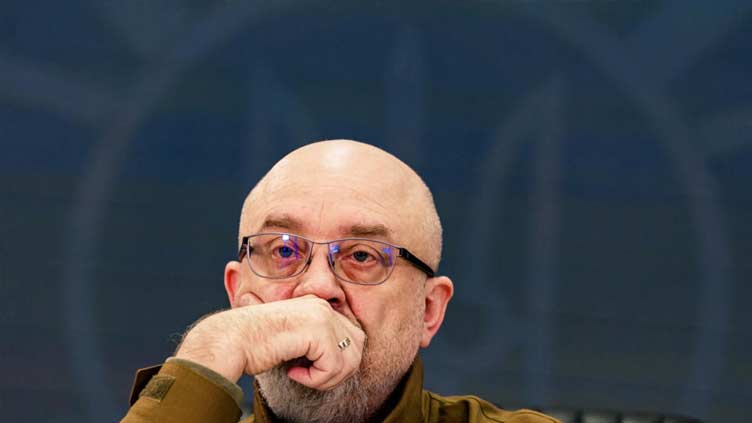Stay or go: fate of Ukraine defence chief hangs in balance

World
Reznikov would be appointed minister for strategic industries: senior lawmaker
KYIV (AFP) – The late-night announcement of a planned replacement of Ukraine’s defence minister has raised eyebrows in wartime Kyiv as the country gears up for an anticipated Russian offensive in the east.
On Sunday night, a senior lawmaker close to President Volodymyr Zelensky announced that Defence Minister Oleksiy Reznikov would be replaced by the head of the military intelligence, Kyrylo Budanov, in the highest-profile government shuffle since the start of the Russian invasion last February.
The surprise announcement followed a series of corruption scandals in the government but David Arakhamia, chief of the parliamentary bloc of Zelensky’s party, did not accuse Reznikov of any wrongdoing, saying the shift was dictated by the logic of "war".
He said Reznikov would be appointed minister for strategic industries.
But confusion only deepened when Arakhamia said Monday that the replacement would not take place this week. The next day Zelensky urged Ukrainians to refrain from "spreading any rumours or other pseudo-information" but confirmed that change was under way.
"We are taking personnel and institutional steps at various levels in the defence and security sector that can strengthen Ukraine’s position," he said.
What exactly is going on?
‘Holding the line’
Ukrainian political analyst Volodymyr Fesenko said that Reznikov’s replacement was postponed following a "rushed" announcement.
"It was not agreed upon -- neither with Reznikov, nor with Budanov," Fesenko told AFP.
Reznikov himself told reporters he had nothing to be ashamed of while adding that he did not have sufficient "expertise" to serve as minister for strategic industries.
"If I received such a proposal from the Ukrainian president or prime minister, I would reject it," he told reporters after Arakhamia’s announcement.
On Tuesday, Reznikov was still in his position.
"Holding the line," he said on Twitter. "Thank you all for your support, as well as constructive criticism. We draw conclusions."
Later that day, Reznikov posted a photo of himself with German Defence Minister Boris Pistorius, who visited Kyiv following Berlin’s pledge to supply Ukraine with heavy tanks.
Fesenko said that while the planned replacement of the minister might be linked to the corruption scandal, it should not be seen as "punishment" for Reznikov.
In his post since November 2021, Reznikov, 56, has become one of the best-known faces of Ukraine’s war effort and spearheaded efforts to secure military aid from Western allies.
But the defence ministry has recently been accused of signing food contracts at grossly inflated prices, among other transgressions. Reznikov’s deputy was forced to resign at the end of January as part of a drive to stamp out corruption and was later arrested.
"Reznikov is valued. The decision to transfer him to another ministry was an attempt to ease political tension," Fesenko said. "There was hope that Budanov would bring order to the ministry."
He added, however, that appointing 37-year-old Budanov, who holds the rank of major general in Ukraine’s army, would pose a legal hurdle as only a civilian can head the defence ministry.
Mariana Bezugla, a lawmaker from the ruling Servant of the People party, said the changes were postponed while the government was evaluating the "risks" of such a reshuffle.
Bogdan Yaremenko, another deputy from Zelensky’s party, said that he did not back the replacement of Reznikov and the reshuffle was postponed because it did not have enough support from lawmakers.
"The defence ministry has enough to be criticised for," he said. "I am convinced that the minister is capable of constructively accepting criticism, drawing conclusions and correcting his own errors or those of others".
- ‘Emotional decision’-
Political analyst Anatoly Oktysiuk said that the planned transfer of Budanov would also affect intelligence operations.
"No one is able to replace him and lead military intelligence in the short term," he said.
He also pointed out that Reznikov managed to build strong connections with Western officials, and questioned whether his successor would be able to take on Reznikov’s role as a "successful diplomat".
"The decision to replace Reznikov was an emotional one," Oktysiuk said. "And when they started thinking who would replace him and how the system would work, there were a lot more questions that answers."

